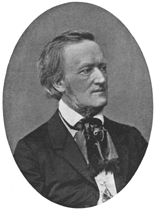II. Short Bio, Long Life
Information from The International
Cyclopedia of Music and Musicians,
(11th Edition, edited by Oscar Thompson; Dodd, Mead & Co.; NY,
1985).
 Wilhelm Richard Wagner was born in Leipzig, Saxony in May
of 1813, the same year as Guiseppe Verdi. Wagner's father, Karl
Friedrich, a police-clerk, died when Richard was six months old; his
mother, Johanna, remarried the next year. Johanna's new husband, an
artist named Ludwig Geyer died in 1821, leaving his brother to fund 7
year old Richard's education. When Richard (he dropped "Wilhelm" from
his name during his adolescence) was 11, he began to study the piano
but was "more interested in opera" (2406). In 1828, Wagner made his
first attempt to compose music after his "first hearing of
Beethoven's music" (Beethoven had died the year before).
Wilhelm Richard Wagner was born in Leipzig, Saxony in May
of 1813, the same year as Guiseppe Verdi. Wagner's father, Karl
Friedrich, a police-clerk, died when Richard was six months old; his
mother, Johanna, remarried the next year. Johanna's new husband, an
artist named Ludwig Geyer died in 1821, leaving his brother to fund 7
year old Richard's education. When Richard (he dropped "Wilhelm" from
his name during his adolescence) was 11, he began to study the piano
but was "more interested in opera" (2406). In 1828, Wagner made his
first attempt to compose music after his "first hearing of
Beethoven's music" (Beethoven had died the year before).
Throughout his youth and indeed the rest of his life, Wagner
pursued the study of the arts of music and poetry with extreme zeal.
When he wasn't composing, he was writing, and vice versa. Although
Wagner was ruled by his passion for music, he maintained an active
social calendar. Wagner married twice. His first wife, Minna Planer,
was an actress in the choral company in which Wagner obtained his
first post as a conductor. Minna left him and returned to him the
year after their marriage. Throughout thirty years of marriage, for
the most part, their relationship was estranged. On the other hand,
Wagner found a soulmate in the form of Cosima Liszt, the young
daughter of the composer Franz Liszt. Wagner and Cosima first met in
1853 when she was just 16. Upon reacquaintance in 1864, they fell in
love. Cosima was 27 and married; Wagner was 51 and still married to
Minna. After Minna's death in 1866 and after Cosima was able to
obtain a divorce from her husband, a man by the name of von Bulow,
Wagner and Cosima finally married on August 25, 1870.
As a composer, Richard Wagner's contribution to music was
sizeable: he wrote almost 11 operas (10 complete since the first was
a fragment), even more orchestal pieces and many other choral and
piano works. But, it was the creation of the four opera cycle of
Der Ring des Nibelungen that perhaps brought Wagner his
greatest sense of personal accomplishment and made him a legend.
Richard Wagner died of a "heart seizure" in Venice in 1883
(2406-7).
[Above right]: Photo of Wagner in 1873. (Engel,
Erich W., Richard Wagner's Leben und Werke im Bilde, C.F.W. Siegel's
Musikalienhandlung; Leipzig, 1922; 482).
Click here to
listen and learn about Leitmotifs
Back to Index
of Wagner's Ring
This site created by Jessica K.
McShan on December 17, 1997.
 Wilhelm Richard Wagner was born in Leipzig, Saxony in May
of 1813, the same year as Guiseppe Verdi. Wagner's father, Karl
Friedrich, a police-clerk, died when Richard was six months old; his
mother, Johanna, remarried the next year. Johanna's new husband, an
artist named Ludwig Geyer died in 1821, leaving his brother to fund 7
year old Richard's education. When Richard (he dropped "Wilhelm" from
his name during his adolescence) was 11, he began to study the piano
but was "more interested in opera" (2406). In 1828, Wagner made his
first attempt to compose music after his "first hearing of
Beethoven's music" (Beethoven had died the year before).
Wilhelm Richard Wagner was born in Leipzig, Saxony in May
of 1813, the same year as Guiseppe Verdi. Wagner's father, Karl
Friedrich, a police-clerk, died when Richard was six months old; his
mother, Johanna, remarried the next year. Johanna's new husband, an
artist named Ludwig Geyer died in 1821, leaving his brother to fund 7
year old Richard's education. When Richard (he dropped "Wilhelm" from
his name during his adolescence) was 11, he began to study the piano
but was "more interested in opera" (2406). In 1828, Wagner made his
first attempt to compose music after his "first hearing of
Beethoven's music" (Beethoven had died the year before).